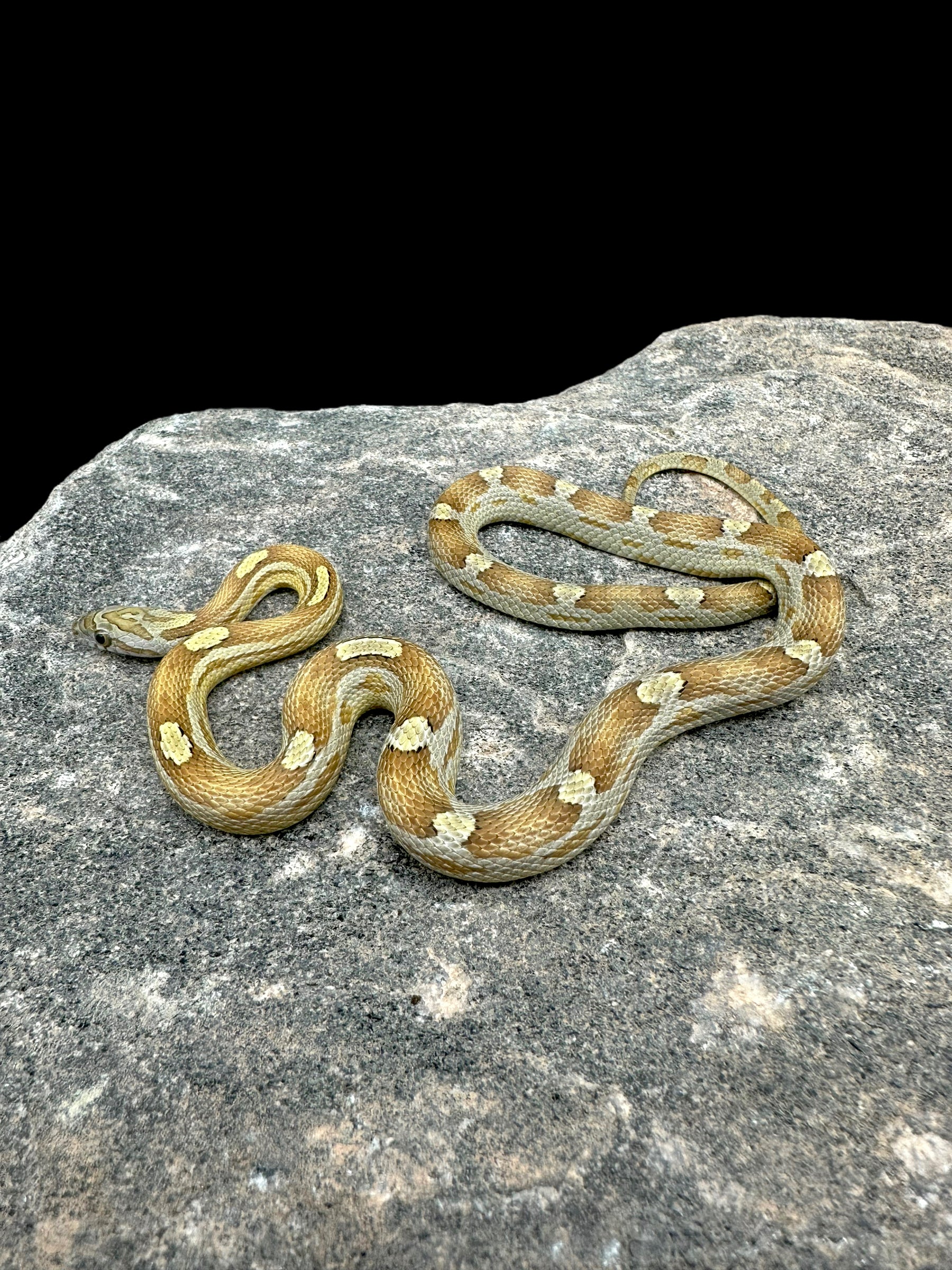Photo Disclaimer
Description
Corn Snake (Caramel Motley)
Scientific Name: Pantherophis guttatus
Common Name: Corn Snake
Species Overview
Size: Adults typically reach 3–5 feet (0.9–1.5 m) in length, with a lean but muscular build and smooth, glossy scales.
Appearance: The Caramel Motley Corn Snake is a golden-toned morph that combines the warm, bronze coloration of the Caramel gene with the smooth patterning of the Motley gene. This Corn Snake displays a radiant gold or amber base color with subtle, connected dorsal blotches that may form elongated chains or merge into continuous stripes along the back. The belly is patternless and cream-colored—a defining feature of the Motley trait—while the sides may show soft transitions from light tan to deep honey hues. The absence of red pigment from the Caramel gene gives the snake its distinctive golden appearance, often with hints of olive or bronze depending on lighting. The overall look is refined and harmonious, making this morph a favorite among keepers seeking a clean, natural aesthetic with a touch of luxury.
Distribution: A selectively bred morph of the Corn Snake (P. guttatus), developed through combination of Carameland Motley genetic lines.
Habitat: Wild Corn Snakes inhabit open forests, meadows, and agricultural areas throughout the southeastern United States. In captivity, they thrive in naturalistic terrariums with secure hides, climbing structures, and natural substrate for burrowing.
Behaviour: Calm, observant, and intelligent. Corn Snakes are crepuscular, most active at dawn and dusk. The Caramel Motley Corn Snake retains the species’ easy-going temperament and feeding reliability, making it both a striking display snake and a valuable breeder.
Captive Care
Enclosure: A naturalistic 40-gallon terrarium (36” × 18” × 18”) or larger is ideal for adults. Use a soil-based or bioactive substrate layered with leaf litter to promote natural behaviors such as burrowing and scent exploration. Provide multiple hides, cork flats, climbing branches, and plant cover for enrichment and security.
Temperature & Humidity: Maintain a daytime gradient of 75–82°F (24–28°C) with a basking area around 86–88°F (30–31°C). Allow nighttime drops to 70°F (21°C). Keep humidity between 40–60%, with a humid hide provided during shedding.
Diet: Offer frozen-thawed rodents every 7–10 days for juveniles and every 10–14 days for adults. Prey should be approximately 1.25× the width of the snake’s mid-body.
Behaviour in Captivity: Calm, consistent, and easy to handle. Corn Snakes thrive in well-decorated naturalistic setups. The Caramel Motley Corn Snake’s warm coloration and smooth, symmetrical pattern make it a standout morph in both home and professional collections.
Special Considerations: Provide shaded areas to prevent color fading from intense lighting. Naturalistic habitats help enhance the snake’s golden tones and overall appearance.
Genetics Note
Caramel (Recessive)
Removes red pigmentation while enhancing yellow and brown tones, creating rich golden coloration.
Motley (Recessive)
Eliminates belly checkering and alters dorsal blotches into connected or elongated patterns, often producing smooth striping or linked markings.
Genetic Combination Summary
The Caramel Motley Corn Snake expresses two visible recessive traits:
-
Caramel = Produces golden to bronze coloration with soft brown patterning
-
Motley = Creates a smooth, connected dorsal pattern and removes belly checkering
Together, these genes produce a Corn Snake with elegant golden hues and a clean, flowing pattern. The Caramel Motley Corn Snake is a refined and balanced morph—visually gentle yet genetically powerful—serving as a foundation for color-enhancing combinations such as Butter Motley and Caramel Stripe.

